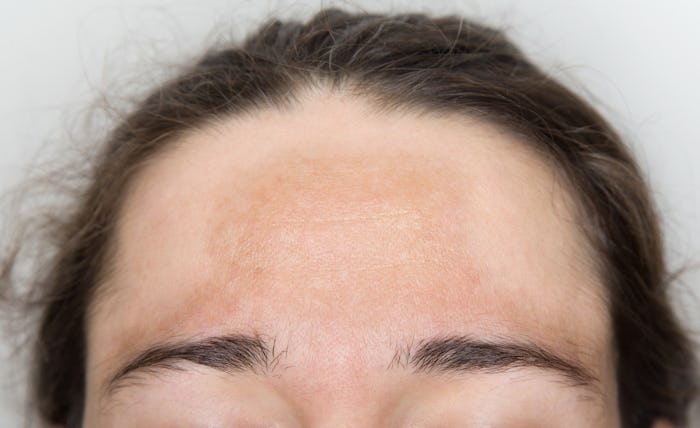Life
The Reason Women Get Pregnancy Mask Is Surprisingly Really Simple
Throughout pregnancy, moms are bound to run into a number of unique, new bodily pop-ups that weren't prevalent pre-baby bump. It's totally normal. But one lovely thing that an alarming amount of moms experience is called pregnancy mask. And it's no surprise that expecting moms want to know what causes pregnancy mask to happen to them. Luckily, it's nothing to be too concerned about.
Pregnancy mask, medically known as melasma or chloasma, is really just caused by extra hormones which creates hyper pigmentation on the skin, according to Mama Natural. It manifests as dark splotches that appear most often around the mouth, forehead, and cheeks. And while it's not painful, it can really catch a woman off guard to see something out of the ordinary pop up on their skin, especially during pregnancy. But know that you're most definitely not alone in your experience because roughly 50 to 70 percent of expecting moms experience pregnancy mask — and that's a crazy high amount.
You already know that when you're pregnant, your hormones are off the charts, and really, this discoloration is solely related to that: hormonal imbalance, particularly a "steep rise in estrogen levels" that creates excess melanin production, according to What to Expect. If you were already dealing with a hormonal imbalance prior to pregnancy, however, it's much more likely you'll deal with pregnancy mask too. Additionally, if you have freckles or moles, they'll probably look darker. And that dark pregnancy line down the middle of your stomach (linea nigra) along with your areolas, will likely look even darker too.
If you're concerned with taking care of pregnancy mask or preventing it, there are some steps you can take to make it less of an issue. PregMed shared that using makeup or skin products that make you more sensitive to UV light will exasperate pregnancy mask, so now is not the time to be using skin brightening products, or spot treating dark spots on your face. In order to help prevent or lighten the affects, longer clothing or umbrellas to limit exposure to direct sunlight is a good idea. You can also take folic acid or eat foods rich in folic acid, like grapefruit, oranges, and leafy green vegetables.
The most important thing to know is that it's not crucial you get rid of pregnancy mask. Although it can make you feel self-conscious, it's not harmful to you or your baby whatsoever. Luckily, pregnancy mask is one of the lesser evils you can come across during a pregnancy, and addressing it can be left up to your comfortability.
Keep in mind that even after you give birth, your pregnancy mask could potentially stick around for a while too. Dermatologist Dr. Bethanee Schlosser told FOX News, “More recent studies have shown that melasma for the great majority of patients is chronic and can last for several years." Although it doesn't happen to all moms, don't be alarmed if you're dealing with dark spots on your skin or sensitivity to sunlight for a time period following your pregnancy. After you're through your pregnancy, there are treatments (that aren't pregnancy-friendly) you can seek out if you continue to feel concerned. The American Academy of Dermatology shared a few options to treat pregnancy mask, like topical creams or procedures such as chemical peels to help accelerate the fading process. But again, it's not a health-concerning issue that you need to feel pressured to pursue.
When it comes to pregnancy mask, luckily there's a pretty simple explanation and little to no health risks that accompany it. Unfortunately, it's quickly becoming one of the most common woes expecting moms deal with during (and after) the nine months leading up to their new arrival. On the bright side, it's one of the milder issues to deal with since it really only affects skin appearance and doesn't cause pain, nausea, or any of the other lovely symptoms that occur throughout pregnancy.
Check out Romper's new video series, Romper's Doula Diaries:
Watch full episodes of Romper's Doula Diaries on Facebook Watch.
